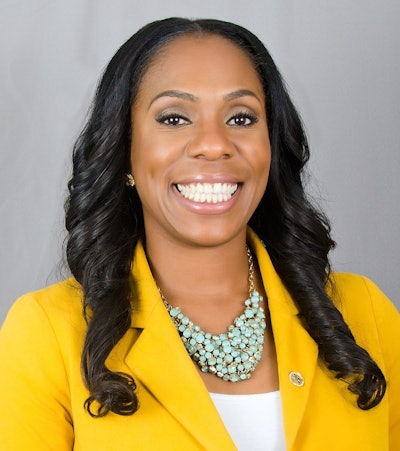 Jennifer Williams
Jennifer WilliamsWhat are your responsibilities as athletic director?
I manage the day-to-day operations of the Department of Intercollegiate Athletics at Alabama State University (ASU), while elevating our brand in the community and across the Southwestern Athletic Conference (SWAC). I champion for my student-athletes and coaches, so that they can afford a top-notch experience while attending ASU.
My ultimate goals are: (1) to be an ambassador for ASU student-athletes, preparing them for life after sport; (2) provide support to my coaches/staff; (3) generate revenue and increase alumni engagement; and (4) make my president’s life easier!
What is the most satisfying thing about your work with student-athletes?
Seeing them accomplish their goals and experience success is the most rewarding part of my job. I love supporting my student-athletes while they win championships and when they land that dream job or internship after graduation.
How does diversity come into play in your role?
As the athletic director, I am very intentional about promoting inclusive excellence and equity throughout my department. Having diverse perspectives only makes your team stronger. Even though I work at a Historically Black College/University (HBCU), it’s important that our coaches and student-athletes understand the importance of diversity.
What do you think the biggest challenge has been in your role during the COVID-19 pandemic?
Relinquishing control. As administrators we’re used to having a plan, working that plan to get the necessary results and, overall, just being in control of situations. But right now, COVID-19 is in control, and has forced many administrators to flex and pivot more frequently — like daily — throughout this pandemic.
What would you recommend to a student-athlete who wants to use their platform to get more involved with mainstream campus activities and/or social activism?
Be intentional and have a well-crafted message. Student-athletes have immense power and the ultimate platform to effect change.
You played college basketball at UNC-Chapel Hill; what was your biggest challenge as a student athlete?
Adjusting to being a role player instead of the go-to/superstar was challenging for me. But once I started to understand the concept that each player on our team had a specific role, I started to thrive. I was determined to be the best leader, defender and rebounder in the ACC. Once I changed my attitude, my overall experience (in regard to basketball) improved. I was eventually named captain my junior and senior seasons and was the only senior to start each game my last year.
What HBCU marching band is the best and who comes a distant second?
Hands down the Mighty Marching Hornets of The Alabama State University, but I do enjoy the Human Jukebox of Southern University.
What song makes you stop whatever you’re doing and start singing and dancing?
“I’m Every Woman” by Whitney Houston — I instantly feel empowered when I hear this song!
What’s the best basketball movie you’ve seen and what did you like about it?
“Love and Basketball” is one of my all-time favorite movies. The movie was extremely relatable to what I experienced as a student-athlete in high school and college. I loved the last scene in the movie, when Monica was playing professional basketball while her daughter and husband watched enthusiastically from the stands. This scene made me feel as if it was possible for professional women to have it all — a loving family and a great career!
This Q&A originally appeared in the November 26, 2020 edition of Diverse. You can find it here.





















